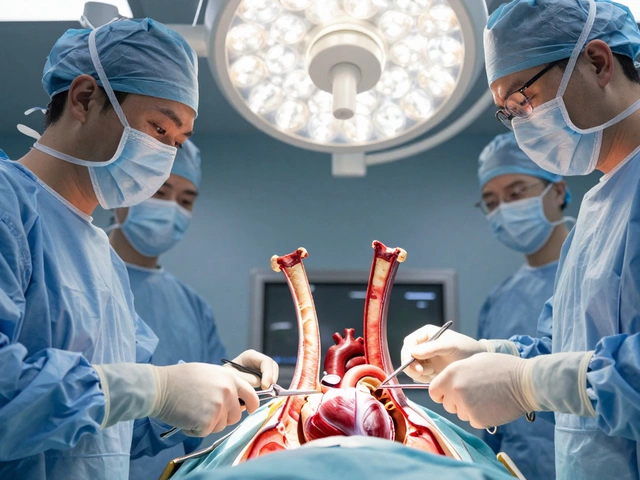- Home
- Health And Wellness
- Recognizing Warning Signs After Heart Surgery

Recognizing Warning Signs After Heart Surgery
Undergoing heart surgery is a significant life event, often pivotal to improving a person's health. But as with any major medical procedure, it brings with it a set of challenges and concerns, especially when it comes to post-operative recovery. Patients and their families are naturally anxious about what to expect once they leave the comfort of the hospital setting.
Living through the recovery phase can feel like walking on a tightrope, with every minor discomfort causing a wave of worry. It's crucial to know what's normal and what's not during this period. Understanding common symptoms and being alert to potential warning signs can make all the difference in ensuring a smooth and safe recovery path.
- Common Post-Surgery Symptoms
- Identifying Dangerous Symptoms
- Care and Monitoring at Home
- When to Contact Your Doctor
- Heart Health Maintenance Tips
Common Post-Surgery Symptoms
Heart surgery is an intense experience for the body, inevitably giving rise to a unique recovery phase filled with its own array of challenges. Common post-surgery symptoms often serve as indicators that the body is healing, though new patients may find them unsettling. One typical symptom is fatigue. After heart surgery, it's not unusual for patients to feel extremely tired. The body is expending a good deal of energy to mend, and resting often becomes a new normal. This exhaustion can continue for several weeks and gradually decreases as the body recovers strength. However, it’s essential to differentiate between usual fatigue and severe exhaustion that doesn't improve with rest.
Pain is another prevalent symptom and can range from mild discomfort to sharper pain, often experienced near incision sites. It's crucial for patients to manage pain according to prescribed regimens to promote healing and avoid unnecessary complications. Common areas of discomfort include the chest, neck, and back. Pain should slowly improve as the healing process advances, but any escalation or sharp, persistent pain warrants immediate medical attention. Swelling or redness around the incisions is also standard but should be monitored closely.
Coughing is frequently observed among patients in the days following surgery. While this sounds concerning, it's usually an expected part of the recovery process, designed to clear the lungs of any fluid buildup. Patients are often provided with a small pillow to hug when coughing to ease the pain and safeguard their stitches. According to Dr. Janet Wyman of the American Heart Association, "Coughing post-surgery is like a self-therapy session for your lungs. It’s tedious, but it’s there to protect other vital organs and prevent infections."
Irregular heartbeats, or arrhythmias, might appear after a heart surgery. A common specific form called atrial fibrillation can be temporary, often resolving itself with time or treatment. Still, patients should be vigilant. Additionally, poor appetite is something many do not expect, but medicinal side effects and the body’s focus on recovery can curb hunger. It's vital to maintain a balanced diet rich in nutrients to support healing, sometimes requiring structured meal plans crafted by healthcare professionals.
One less-discussed but frequent symptom is mood changes. Surgery and the subsequent recovery period can play havoc with emotions. Feelings of depression, anxiety, or heightened emotional sensitivity often accompany anyone who has undergone such a life-altering procedure. It is essential to acknowledge these feelings as typical and to seek support from mental health professionals when needed. The journey through recovery calls for patience and understanding, knowing well that what feels abnormal might just be par for the course on the road to recovery. Armed with the right information, recovering from heart surgery becomes a manageable, though challenging, task for anyone involved.

Care and Monitoring at Home
Once a patient is discharged after a heart surgery, the journey isn't quite over; it merely transitions into another phase, crucial for long-term recovery. Home care post-heart surgery is as significant as the surgery itself because it lays the groundwork for long-term heart health. It's essential that patients, along with their caregivers, are well-informed and prepared to take the necessary steps in monitoring and care.
First, it’s important to adhere to prescribed medications strictly. These medications play a key role in managing pain, preventing infection, and ensuring that the heart continues to recover properly. Missing doses or deciding to alter the prescribed regimen without consulting a doctor can lead to unnecessary complications. Keeping a daily log of the medications taken might help ensure compliance and bring peace of mind.
Another cornerstone of care at home is monitoring post-surgery symptoms effectively. This involves observing and documenting any changes in the patient’s condition, no matter how minor they may seem. It's helpful to keep track of vital signs like blood pressure and heart rate on a daily basis. Many patients find electronic devices that record this data to be invaluable. In some instances, installing a blood pressure monitor at home provides constant reassurance and prompts timely action if values deviate from the norm.
Importance of Rest and Diet
Balancing rest with light activity is vital. While excessive exertion should be avoided, simple activities like walking around the house every hour can help with circulation and prevent stiffness. A helpful tip is to set reminders for these mini-breaks as part of a planned care schedule. When it comes to sleeping, finding a comfortable position is paramount. Some patients require extra pillows to prop them up or avoid sleeping on the side where an incision may be sensitive.
Nutritional intake also plays a pivotal role during this phase of recovery. A diet rich in fruits, vegetables, lean protein, and whole grains supports the body’s natural healing processes. Limiting salt, sugar, and unhealthy fats can help shirk long-term cardiac stress. Proper hydration should not be overlooked, and while caffeine might be tempting, it’s usually best to consume it in moderation or replace it with healthier alternatives like herbal teas.
Engagement with Healthcare Providers
Another key to recovery is open communication with healthcare providers. Don’t hesitate to reach out with concerns or questions regarding unusual symptoms. Scheduled follow-up appointments should not only involve the cardiothoracic team but also a primary care physician who can monitor other aspects of health that could impact the heart. Telehealth options are increasingly available and can be a convenient way to stay connected with your care team without enduring the hassle of travel.
Dr. John Smith, a prominent cardiologist, once advised, "Being proactive about your recovery at home is as critical as any post-surgical care in the hospital. Patients who are well-prepared often have better outcomes and fewer complications."
Patients tackling heart surgery recovery should embrace the process with informed optimism, understanding their role in the care that forms lasting impact on their health journey.

When to Contact Your Doctor
Post-heart surgery recovery can be unpredictable at times. While it's normal to experience some discomfort, certain symptoms could signal complications that need immediate medical attention. Understanding when to reach out to your doctor is crucial for maintaining your health and keeping your recovery on track. Knowing these red flags can help you act swiftly, avoiding further medical issues and ensuring peace of mind.
Firstly, if you notice any signs of infection such as redness, swelling, or discharge at the incision site, it's important to make a call to your healthcare provider. Increased pain or tenderness around the incision can also indicate infection. Fever that spikes above 100.4 degrees Fahrenheit (38 degrees Celsius) is another significant warning sign. High fevers might be your body's way of telling you that an infection could be running rampant. If you experience any of these symptoms, they're sure signs that your body might need extra help in healing.
A feeling of shortness of breath or difficulty breathing should not be taken lightly. It could signify issues such as a clot or another heart-related complication. Similarly, feeling of dizziness or sudden weakness might seem harmless at first, but they could possibly indicate low blood pressure or cardiac complications that need urgent attention. Whenever in doubt, contacting your doctor can often provide the reassurance and guidance necessary to address these symptoms properly.
Chest pain is undoubtedly one of the more alarming symptoms. Though some mild chest discomfort is expected post-surgery, intense or sharp pain shouldn't be ignored. This could be a signal of a serious issue, such as a heart attack or arrhythmia. If you're unable to get in touch with your cardiac surgeon, it's critical to seek emergency medical attention immediately. The faster these symptoms are evaluated, the better the outcomes generally are.
According to Dr. James Smith from the American Heart Association, "Timely communication with your healthcare team can significantly improve post-surgery outcomes. Never hesitate to reach out if something doesn't feel right."Monitoring your weight is another important aspect of recovery. Sudden weight gain, say over 3 pounds in a single day or 5 pounds in a week, could potentially indicate fluid retention, a condition often associated with heart issues. Excessive swelling in your legs or around your abdomen can also be a sign of concern. Tracking your weight regularly and noticing these changes can help you make informed decisions about when to contact your doctor.
Using a log to record any unusual symptoms or changes in your health condition can be a useful tool. This not only helps you organize your thoughts but can also be beneficial when discussing these symptoms with your doctor. Some useful things to note might include the time of day the symptom occurs, its intensity, and any possible triggers you might identify. An accurate record can assist your healthcare provider in making a more precise diagnosis, potentially averting severe health issues.
Being proactive and observant about your symptoms can make a world of difference during the recovery period. While it's tempting to dismiss some symptoms as mere nuisances, taking them seriously could significantly impact your heart health and overall recovery after surgery. Remember, when it comes to your health, it's always better to be cautious and reach out to your medical team whenever you're in doubt.

Heart Health Maintenance Tips
Emerging from heart surgery can be daunting, and nurturing your heart back to optimal health requires vigilance and dedication. It isn't just about popping a few pills and following doctor's orders; it involves a comprehensive lifestyle commitment. Every action you take post-surgery can make a significant difference, influencing both your immediate recovery and long-term heart health.
The first step is maintaining open communication with your healthcare provider about your heart surgery recovery journey. Discuss your concerns and closely adhere to your medication regimen. Medications are not merely prescribed arbitrarily; each plays a crucial role in supporting your heart's recovery, whether it's managing blood pressure or thinning the blood to keep clots at bay.
Another key aspect is nutrition. Fueling your body with the right foods isn't just about bolstering recovery—it's about laying the foundation for lifelong heart health. Incorporating a diet rich in vegetables, fruits, whole grains, and lean proteins is essential. Limiting salt and processed foods can significantly reduce the strain on your heart and help control high blood pressure. An inspiring quote from the American Heart Association says it clearly:
"Eating a heart-healthy diet can lead to 20% lower risk of heart disease."
Don't underestimate the power of physical activity, even if you're not quite ready for vigorous workouts yet. Gentle movements and stretches can enhance circulation and support healing, gradually paving the way for more active routines. As your strength returns, aim for at least 30 minutes of moderate exercise most days of the week. This could be as simple as walking, swimming, or cycling, all of which strengthen the heart and improve vascular health.
- Stay consistent with medical follow-ups.
- Manage stress through breathing exercises, yoga, or meditation.
- Avoid smoking and limit alcohol consumption.
Finally, prioritizing mental well-being is often overlooked but crucial. The mental toll of surgery can sometimes lead to mood changes and depression. A positive mental outlook, possibly supported by therapy or support groups, can enhance recovery outcomes. A notable quote from Dr. Dean Ornish underscores this:
"Health is more than the absence of disease. It’s about feeling vital, full of energy, and inspired to live life."
Maintaining heart health is an ongoing process. Regular check-ups and proactive lifestyle changes are not just short-term interventions; they are lifelong commitments to protecting your most vital organ. Remember, every step you take towards better health not only benefits your heart but enriches your overall quality of life, allowing you to embrace each day with vigor.

Arnav Singh
I am a health expert with a focus on medicine-related topics in India. My work involves researching and writing articles that aim to inform and educate readers about health and wellness practices. I enjoy exploring the intersections of traditional and modern medicine and how they impact healthcare in the Indian context. Writing for various health magazines and platforms allows me to share my insights with a wider audience.
About
Medical Resource Center India is a comprehensive online platform dedicated to providing reliable health information and medical resources in India. Explore a wide range of articles, tips, and advice on medicine, healthcare services, and wellness. Stay informed about the latest developments in Indian medicine and access valuable insights into maintaining a healthy lifestyle. Discover expert guidance and health solutions tailored for every Indian citizen. Your go-to destination for authoritative medical knowledge in India.



